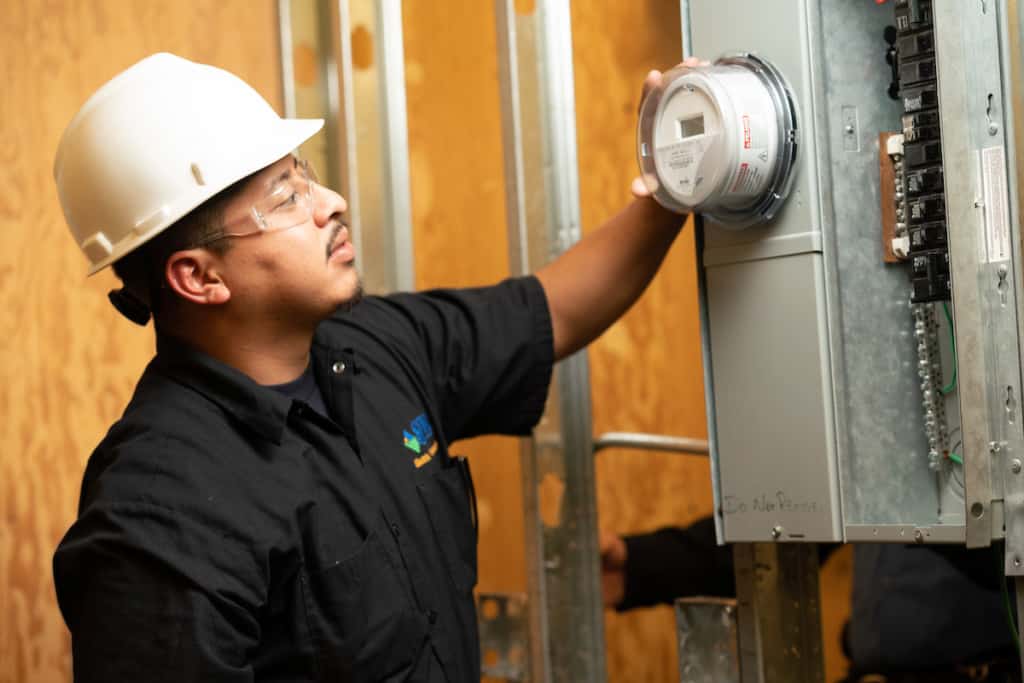What Is an Electrician and What Does One Do?
Electricians install, maintain and repair components of the systems that provide electrical power in buildings and other structures. Electrical work also covers systems for communications and lighting as well as control systems in factories, commercial buildings, and residential buildings.1
Electricians perform tasks such as:
- Inspecting electrical components like circuit breakers.
- Installing and maintaining electrical wiring, controls, and lighting systems.
- Operating hand and power tools to repair or replace fixtures, wiring, and equipment.
- Overseeing and training other electrical workers.
- Reading blueprints that show where circuits, outlets and other equipment should be located in a building.
- Using testing devices to find electrical problems.
Electricians must understand and follow local and state building codes that are based on the National Electrical Code. They may work in buildings that are under construction, installing wiring and other equipment before it’s hidden behind walls.
Electricians who maintain equipment have to identify and repair equipment not working correctly. They may have to fix or replace parts of electrical equipment that could range from a lighting fixture to a motor.
Experienced electricians may help design the electrical system for a new building while working with a building engineer or architect. They may work with other contractors on projects such as HVAC design and installation.
Benefits of Being an Electrician
When you train as an electrician, you develop skills that are in demand. As you gain more experience and learn to do more as a chief electrician, your pay can increase.2
If you’re entrepreneurial, you can be self-employed and set your own work schedule by working as an electrical subcontractor for a home builder or construction company. You could also start your own electrical contracting company if you want to use your electrician skills to build a business.
 Why Become an Electrician?
Why Become an Electrician?
When you complete your electrician training, you’re ready to enter a field where jobs are growing. The Bureau of Labor Statistics projects that electrician job growth will be good.3
The need for electricians is growing because building construction is up and because the country is turning to alternative energy sources. As more power is being generated by solar and wind energy, the nation needs more electricians to fill alternative energy installation jobs.
Electricians who know how to perform a variety of jobs—such as installing solar panels, wiring industrial components, and repairing electrical systems—will have the most job opportunities, according to the BLS.
Electrician Jobs
As a specialized tradesman, you may have various job titles, depending upon exactly what sort of work you do or the level of training you have. Electrician specialties include:
- Residential electricians: They install or repair electrical components in homes, from putting wiring in a house under construction to replacing an obsolete component or system in an existing building.
- Industrial electricians: They work in large industrial buildings with heavy equipment and machinery, such as power plants or manufacturing facilities.
- Inside wiremen: They install and maintain the electrical systems found inside a commercial or industrial building, such as lighting, heating equipment, control systems, and receptacles. The inside wireman and trainees, called a journeyman wireman, may install fire alarm systems, security systems, or conduit to take wire from a control panel to the equipment.6
- Outside lineman: They work on the power lines that deliver electricity to buildings.
- Journeyman electrician: They are a step above an apprentice electrician, who is a trainee learning about electronics. A journeyman has completed the required coursework and passed a certification exam. Because they have more experience and education, journeyman electricians can work without supervision and perform more complex work than apprentices.
- Maintenance electricians: They oversee large electrical systems that are used to power plants and factories. They make sure the systems are working safely and efficiently by inspecting the equipment, replacing and repairing parts as necessary, and maintaining programmable logic functions.
Incidentally, despite such titles as “lineman,” “wireman,” and “journeyman,” not all electricians are men. The percentage of female electricians is 2.4%, according to the New York Times, and 9.5% of electrical contracting businesses are owned by women.7
The largest union of electricians is the International Brotherhood of Electrical Workers, which has about 775,000 members in the U.S. and Canada. The IBEW has locals all over the state of California.
According to Electrical Construction and Maintenance Magazine’s list of the Top 50 Electrical Contractors for 2020, several of the biggest electrical contractors in the U.S. are based in California.9 Those include:
- Cupertino Electric Inc. of San Jose
- Helix Electric Inc. of San Diego
- Redwood Electric Group Inc. of Santa Clara
- Bergelectric Corp. of Carlsbad
- CSI Electrical Contractors of Santa Fe Springs
- Sprig Electric Co. of San Jose
 Why Become an Electrician?
Why Become an Electrician?